 |
|
|
 |
2004
June
29-30
|
Off to the Old Country
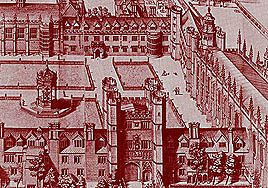 I'm scrambling to get ready for a trip to England
with one or two graduate students.
We'll start in Cambridge (depicted here)
and attend meetings in London and Oxford,
including presenting a paper at a conference
on The Origins of Language and Psychosis.
I'm scrambling to get ready for a trip to England
with one or two graduate students.
We'll start in Cambridge (depicted here)
and attend meetings in London and Oxford,
including presenting a paper at a conference
on The Origins of Language and Psychosis.
Our research has to do with using computers to measure abnormalities of language.
This is very relevant to psychiatric diagnosis.
Very little of our research has been published yet; the paper we're presenting
is actually just gleanings from our review of prior work.
The main theme of the conference is whether mental illness (especially schizophrenia) is linked
to the (comparatively recent) evolutionary origin of human language.
One of the puzzles of evolutionary biology is how people got to be so smart so recently
(less than 100,000 years ago, perhaps much less).
T. J. Crow and others argue that "schizophrenia is the price Homo sapiens pays for
language," i.e., implementing language required a major change in
the brain's software architecture that is still somewhat rickety and unreliable.
We don't know much about that, but we're very interested in characterizing the effect
of mental illness on language.
Now you know a little about what I do in my day job.

|
 |
2004
June
28
|
No more COMDEX?
CNET reports that
COMDEX won't happen this year.
COMDEX, for those who don't know, is - or was - the major industry trade show for personal computers.
It started as a "Computer Dealers' Exposition" (hence the name) in Las Vegas in 1979
(when there were just starting to be computer dealers, as
distinct from big manufacturers that sold big machines directly).
The "Fall COMDEX" in Las Vegas has always been the main event, but in the 1980s there were
"Spring COMDEX" shows, mostly in Atlanta.
I always drove to COMDEX from home rather than staying in a hotel, so I missed the wild partying.
But the show itself was fascinating enough.
As newlyweds, Melody and I, along with our neighbor Ken Waletzki, spent a day at "COMDEX/Spring 1984"
in the Los Angeles Convention Center.
That was just before the IBM PC became the dominant personal computer - so there were plenty of Apples,
Ataris, Kaypros, and oddballs.
AT&T was displaying its new (and now forgotten) 3B2 systems in a room populated by salesmen in expensive
suits who started by asking if I had "signature authority" to buy computers for my institution.
Just outside were Apple II video games and Taiwanese component importers.
At COMDEX 1984, we collected plastic shopping bags from perhaps 100 vendors.
(I told Melody and Ken that it would be handy to have a few; they went overboard.)
We still have these, packed in a trunk, but I don't know their condition.
(Maybe I should sell the collection to the highest bidder...? First $5K takes 'em, if I can find 'em...)
The next year, and for many years afterward, COMDEX/Spring was in Atlanta, and we had moved to Georgia,
so we drove over.
Throughout the 80s it took two or three days to see COMDEX.
I often rode over with my colleague Bob Stearns and/or with Melody.
On at least two occasions PC Tech Journal treated its authors (including me) to dinners
at fine Atlanta restaurants.
That's where I got to know
Jeff Duntemann
(now a lifelong friend),
Will Fastie (who was then the editor),
Carole Eyring,
and others whom I can no longer locate... A fine crowd. Where are they now?
Another highlight was IBM's series of technical seminars on the PS/2 architecture in 1987
or 1988. I still have the booklets they gave out.
With no World Wide Web, printed documentation was very important to us.
Unfortunately the PS/2 sank into complete obscurity very soon.
The industry-standard (not IBM-exclusive)
PCI Bus did the same job almost as well and could be combined with ISA Bus on the same motherboard.
And Compaq (a clone maker) brought out a 386 PC before IBM did, dethroning IBM as technological leader.
In the 1990s, the Atlanta COMDEX shrank dramatically; I don't remember if Melody and I attended the last one
or just the next-to-last, but we came away with the impression that we would have been better off strolling
through a major Atlanta computer store.
There was simply nothing new to see.
And the World Wide Web had taken away the need to turn up in person to hear about new technology.

|
 |
2004
June
27
|
Dept. of Unintentional Humor
 As the postmark on a sympathy card, perhaps this one
doesn't strike quite the right note!
As the postmark on a sympathy card, perhaps this one
doesn't strike quite the right note!
Fortunately, the sympathy card was for Charles the Rat,
sent by the veterinarian who takes care of our pets.
The postmark might have been genuinely bothersome on a sympathy card for a
dear departed relative.
That's why I don't think the Postal Service should print movie advertisements
on our mail.
(And what do other movie studios think of having a competitor's ads printed on their outgoing mail?)

|
 |
2004
June
26
|
Blog Frog / Miscellany

This little fellow and many of his species live in our backyard.
Cathy has tentatively identified
them as spring peepers.
They are very noisy. Squaaaaaaak!
What's curious is that the two of them that we've handled
(to relocate them after removing the plants they lived in) seem
to like human company.
Look at this one climbing onto my finger.
A paradoxical thing about the holes in Internet Explorer is that they result
from Microsoft trying to share the Web with others rather than monopolize it.
The idea is that IE extensions (like Macromedia Flash) would proliferate and you'd
acquire them automatically.
Instead, the bad guys moved in, and we can't do that.
Apropos of my April 1 entry,
Jim Mischel
writes to remind me
that environment variables are not the correct way for a program to find out
where My Documents and other special folders are. He writes:
If you're writing to the Windows API (i.e. not a .NET program), you
should call SHGetFolderPath or SHGetFolderLocation. Those two work for
Windows 2000 and later. For Win9X, the recommended functions are
SHGetSpecialFolderPath and SHGetSpecialFolderLocation. The
documentation for these functions says that using the environment
strings directly (i.e. %ProgramFiles%) might be unreliable. Like much
of the Windows API, these functions are very difficult to use.
The recommended way to get folder locations in .NET programs is to call
the System.Environment.GetFolderPath() method.
In a dim way, I knew that, but it somehow didn't come up into active memory
when I was writing that entry. I'll insert a correction there today, so that people
who look it up in the archives will find it.

|
 |
2004
June
24-25
|
More computer crime, and a clue about Trojan Horses
The BBC reports
that Trojan Horses (software installed on your computer without your consent) are still a
major hazard in Internet Explorer.
In today's caper, a gang broke into a large number of widely trusted web servers - news
media sites, and the like, where you wouldn't expect anything malicious - and installed code
to download a Trojan Horse that would capture keystrokes and mine them for credit card numbers.
Their server was quickly located and shut down, and, I presume, so were the perpetrators.
The problem is, Internet Explorer was designed to do something very dangerous - download
software automatically to help people view special web pages.
This was supposed to make it easier for Grandma to see the baby pictures
(which is, of course, the initial mass-market appeal of the Web).
It soon became obvious that this was intolerably dangerous, and Microsoft has been trying to
restrict it ever since, but people keep getting around the restrictions.
At least temporarily, I'm switching to
the Opera web browser,
which is freeware (supported by small, tasteful banner ads) and has better security
as well as better performance.
If you never build holes in the first place, you don't have to plug them later.
Besides, a web server can't distinguish Opera from Internet Explorer.
Thus it's very unlikely that anyone will try to create any Opera-specific exploits.
The only problem I've noticed so far is that Opera doesn't support the colored horizontal rules
that I've been using on this web site.
So today I changed them to something else very similar in appearance, but
actually constructed by expanding a graphic.
Concerning the picture problem that I mentioned last time, I've noticed that Compaq
1400×1050 laptops don't have it, even when running in exactly the same mode.
So it's a problem specific to the Intel graphics driver in the Dell laptop, and
presumably they'll fix it.
Maybe the updated driver is already out there...
Software bug of the day: The MATLAB license server uses Ethernet card MAC addresses to identify
the PC on which it's running.
But ours happens to be running on a PC with two Ethernet cards.
Of course it got the wrong one, and there's no way to tell it which one to use.

|
 |
2004
June
23
|
Do your pictures look awful in Internet Explorer?
 If you have a fairly new computer, and some pictures in Internet Explorer look bad
(pixellated, with type almost illegible), I think I know why.
If you have a fairly new computer, and some pictures in Internet Explorer look bad
(pixellated, with type almost illegible), I think I know why.
Look at the screen shots in yesterday's entry
or the words "Can you read this?" above.
They should look almost exactly like real windows on your screen,
with just a tiny bit of blur added by JPEG compression.
Today I have a new laptop with 1400×1050 graphics resolution,
and I was dismayed to see jagged, pixellated lettering in those
pictures.
The reason?
Windows has an option to enlarge all graphics for people who have a lot
of graphics capacity on a small screen.
For example, my computer gets 1400 pixels into a space less than 14 inches wide.
Displayed normally, most things look rather small.
Right-click on a blank area of the desktop.
Choose Properties, Settings, Advanced.
You'll see a DPI Setting that tells Windows whether the pixels on your
screen are closer together than what Windows is designed for.
If so, Windows can enlarge everything.
The trouble is, the enlargement algorithm is not very good.
It makes hash of lettering and other kinds of fine detail in pictures.
Lettering outside of pictures - that is, lettering which is known to the computer
as lettering - looks just fine.
I chose to turn off the enlargement (by setting DPI to Normal)
and instead set the screen to 1024×768. That's slightly blurry
(on a 1400×1050 array of pixels), but it's not jagged or unnatural.
When I need a lot of screen space, I'll just switch back to 1400×1050.
This laptop belongs to the University.
My personal laptop, of Japanese manufacture, has picked up the nickname Kamikaze because
it seems so eager to destroy itself.
The lid doesn't latch, the disk drive occasionally won't start up unless I shake the machine a bit
("stiction"), and as of last night, one of the hinges is starting to break.
Fortunately I bought a 3-year extended warranty on it. It's 2 years and 2 months old.
Now that I can do without it for a few days, it's going to the shop!

|
 |
2004
June
22
|
Copyrights and how to live longer
This morning's news bring several interesting items.
Much of the computer industry is (in my opinion correctly)
calling for changes in copyright law
to eliminate a ban on software supposedly designed to break copyrights.
I respect copyrights; in fact I own a lot of them (maybe hundreds).
But copyright law is intended to prevent redistribution, not to prevent
people from reading things they own!
I think anybody who buys a copyrighted book, disc, CD, or DVD has certain
moral rights:
- To read (or view) the material;
- To make backup copies, on any media, for one's own use;
- To know the details the recording process, including protection schemes built into it.
(The proposed law will specifically require disclosure of copy protection in
advance of purchase; that's a Good Thing.)
Hollywood has been upset ever since vinyl phonograph records went out of style.
What they liked about vinyl records is that they wore out quickly, so you
couldn't use them forever, and there certainly wasn't much of a market for used ones
(except for rare items that didn't represent lost sales because they were no longer
being offered new).
In fact you might have to buy your own favorite record more than once.
And back then, although we could copy our records onto tape,
the recordings weren't very
good unless we used expensive equipment and materials
(reel-to-reel tape as expensive as the original record).
Today, we have digital media that make perfect, lossless copies and Hollywood is
in a panic.
A CD or DVD costs $2 to make, and they want to sell it for $20 and prohibit us from copying it
even for our own use.
I don't think Hollywood is holding the moral high ground here.
I'm strongly against CD and DVD piracy, but - as the computer industry learned in the late 1980s -
the best defense against piracy is to offer a reasonable product at a reasonable price.
Get rid of the complicated protection schemes, bring the selling price down closer to the
manufacturing price, and educate the public - but first present yourselves as reasonable people.
And as Jeff Duntemann pointed out a long time ago,
not every pirated copy is a lost sale.
Often, it is a sale you could have made if the price had been lower.
If piracy is stamped out, not every pirated copy will be replaced by a legitimate purchase.
Lots of people will choose simply to do without.
Want to live 10 years longer?
Quit smoking.
And if you still believe abortion is merely the extraction of unwanted tissue,
"every woman's right," read
this BBC news story.
I don't normally discuss highly controversial issues in this blog, but I'll toss out two
observations about abortion.
First: The people who most advocate abortion
seem unwilling to let the public know what it's really like.
Second: The people who most want it seem to be men, not women; unrestricted abortion is a
convenience for impatient boyfriends, as Susan B. Anthony observed many years ago.

|
 |
2004
June
21
|
Two security hints
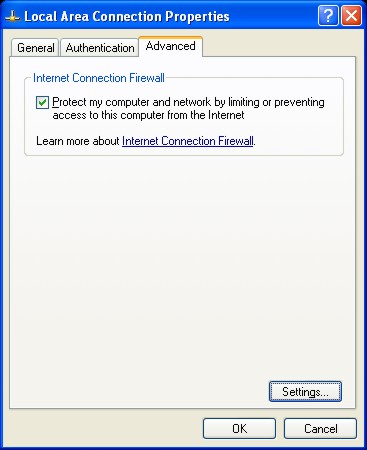 (1)
Before connecting your PC to any unknown network,
such as a wireless network in a hotel,
turn on Internet Connection Firewall (ICF).
(1)
Before connecting your PC to any unknown network,
such as a wireless network in a hotel,
turn on Internet Connection Firewall (ICF).
(Control Panel, Network Connections, pick the connection, Properties, Advanced,
and check the box shown.)
This isn't perfect protection, but it's surprisingly good, especially if you
turn on logging (under Settings) and occasionally look at the logs.
And it's a separate layer of protection from any other security software you may
be running.
But doesn't my antivirus software do this? No.
Only a fool runs a PC without antivirus software.
But antivirus software does not protect you from all types of network attacks.
That's why you need a firewall, whether hardware or software (or both).
However, you may not be able to run Internet Connection Firewall on a local
area network (nor put any other kind of firewall between your PC and the LAN).
It interferes with some of the functions needed for network browsing.
On one of my networks, ICF works just fine on the client machines (the ones that
don't share any files of their own); on the other, ICF absolutely precludes
participation in the network. Experiment.
If you really want to have ICF and also have file sharing, you can set ICF to enable
UDP ports 137, 138, and 445, and TCP ports 139 and 445.
But then you lose a good bit of the protection that you need when you go to a
publicly available network.
There are better software firewalls that check where the data packets are coming from
before allowing them in. F-Secure
Internet Security has been highly recommended to me.
Also, a much better Internet Connection Firewall is reportedly coming in
Windows XP Service Pack 2.
(2) Your computer should not answer pings from elsewhere on the Internet,
unless it's a web server whose presence would be obvious anyway.
Turning on Internet Connection Firewall will stop your computer from answering pings.
So will anything else that disables incoming ICMP traffic.
A ping is a request for a computer to tell you whether it's there. For example:
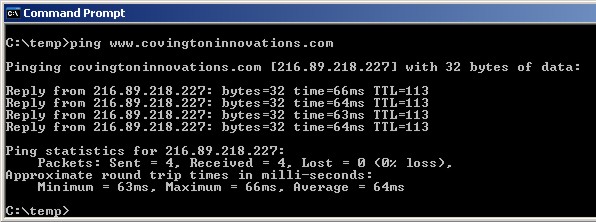
And computer vandals use the ping command to find computers to attack.
They'll ping every IP number from 0.0.0.0 to 255.255.255.255
(well, not quite, but you get the idea).
They try other things too, but pings are one of the most innocuous tests they
can perform, since in the old days, all computers were supposed to answer pings,
and it was a routine way of testing networks.
If they can't ping you, they'll probably never even know you exist.
At least, this is true of a fairly large class of attacks.
And in computer crime, there's always room at the bottom - the least
sophisticated attacks remain the most common.
Farewell, firewall: The Hotbrick firewall turns out not to have PPTP pass-through
(even though there's a selection for it in the configuration menu), so we can't use it,
and it's going back to the vendor.

|
 |
2004
June
19-20
|
Capture online maps as screen shots / Een Nederlandse firewall
If you use map services like
Mapquest
or (in Britain) Streetmap,
you may want to save copies of the maps for printing or other use.
(Only your own use, of course; they're copyrighted.)
I like to save them, run them through Photoshop for sharpening and resizing,
and then print them out.
But the problem is the map isn't transmitted to you as a single picture.
It is actually a grid of pictures, and if you right-click "Save picture as..."
you'll only get one of them.
The trick?
Take a screen shot instead.
Hold down Alt and press Print Screen (PrtSc).
This captures a graphical image of the current window which you can paste into
Word or any graphics program.
In the same way, you can capture anything that's on your screen.
This is handy for recording error messages
and for writing documentation.
The cursor and the mouse arrow don't normally show up in screen shots.
If you want to take screen shots that show them
(for documentation or the like), I recommend a utility called
FullShot.
I'm looking to exchange information and questions with
other people who are using a low-priced but
sparingly-documented Dutch-made firewall called a
HotBrick.
So far I've found one fairly illuminating newsgroup discussion
that was in Dutch (not an obstacle for a linguist!).
If you have HotBrick experience, drop me a line and let's confer.
(No, this is not a paying job. And no, hackers, I won't say where I'm
using it; not even in what part of the world.
The fact that it's Dutch should be a big hint.
Covington Innovations is small but international...)
Get 'em while you can! My auction items
on
eBay
and
Astromart Auctions
are in their last 24 hours; one of them received no bids for the first 6 days, and maybe even yet.
The classified-ad items have already sold.
I finally tasted
Pepsi Edge
yesterday.
I'm not sure whether it's better than Coke C2.
Actually, to me, Coke C2 resembles old Coke in a noticeable way.
By old Coke I mean pre-1980-or-so Coke, before they started replacing
sugar with corn syrup.
That started well before the "new Coke" fiasco of 1985.
Either I got more sensitive to it, or Coke got sweeter in the 1980s.
Yes, I've taken a day off.
But I didn't promise you a blog entry every day.
I may miss quite a few when I'm in England early next month.

|
 |
2004
June
18
|
Babbage the Schnoodle

We will soon have another family member, a schnoodle - a crossbreed
between schnauzer and poodle - arguably our first normal pet ever.
(Melody and I both had dogs in our youth, but not after we got married.)
A schnoodle is, in our opinion, a more handsome animal than either
a schnauzer or a poodle; the peculiarities cancel out, making a nice balance.
We've named this one Babbage after the computer pioneer, and because he's
about the size of a cabbage.
He'll never grow very big, but he'll be a very good companion.
In my less respectful moments I've been calling him
"canine cat" and "Babbage the microdog."
He's still at the home of his
his breeder;
he'll move in with us in mid-July.

|
 |
2004
June
17
|
Giving good presentations
I'm too busy to write anything today,
but my student Lorina Naci recommends
this
guide to giving a good scientific or technical presentation.
And I recommend it too.
I'll be speaking to the Athens, Georgia, Kiwanis Club this coming Tuesday. Come one, come all...

|
 |
2004
June
16
|
Do not "do not spam"
The FTC has decided
not to establish a
national do-not-spam list.
I agree wholeheartedly. Nobody wants to receive spam.
The list would give the impression that the people not on it are willing to be spammed.
I feel the same way about the do-not-call list for telemarketers.
Just ban telemarketing.
Nobody wants to receive those calls.
And if a do-not-spam list were established, it would have to be made public,
and spammers would mine it for addresses - and spam them,
or even impersonate them.
That is the FTC's reasoning, and they're right on the money.

|
 |
2004
June
15
|
Against registering online newspaper readers
At last, someone other than me has pointed out
that it's a bad idea to make people register
in order to read online newspapers.
You can read about it on
CNN, which does not require registration.
My original argument is
here.
On the subject of low-sugar soft drinks, David Stafford writes to suggest
drinking a mixture of half Coca-Cola and half club soda.
Similar to Coke C2 at half the price?

|
 |
2004
June
14
|
Semi-diet Coke / Sale
Coke C2, the new half-sugar version of Coca-Cola, came out today.
My impression: It's a lot better than Diet Coke, which in turn was a lot
better than Tab.
It tastes like maybe 2 parts Coke, 1 part Diet Coke, and 1 part water.
Potable, and it will probably get some weight off of me.
The Coke C2 website is
a bit unnerving, though.
What's all this about logging in?
And what are the quizzes about "what do you really want"?
Is this a soft drink or a new sect of Buddhism?
I can taste the aspartame in Coke C2, though there isn't much of it.
I'm looking forward to trying
Pepsi Edge,
which doesn't contain aspartame,
and also has a much more straightforward web site.
I'm selling a few things on
eBay,
Astromart Classifieds,
and
Astromart Auctions.
Check 'em out...

|
 |
2004
June
13
|
Oops, I misplaced a star...
 In one of my books,
Celestial Objects for Modern Telescopes,
I included a list of 200 interesting sky objects.
One object, the variable star Chi Cygni,
was listed with an incorrect declination
(latitude relative to the celestial equator).
In one of my books,
Celestial Objects for Modern Telescopes,
I included a list of 200 interesting sky objects.
One object, the variable star Chi Cygni,
was listed with an incorrect declination
(latitude relative to the celestial equator).
I discovered this because several software packages,
including TheSky, now include my list in
their databases - and I saw Chi Cygni plotted
in the wrong place.
Corrections for the book and correct data files for
several software packages are
here.

|
 |
2004
June
12
|
Redecorating the sky
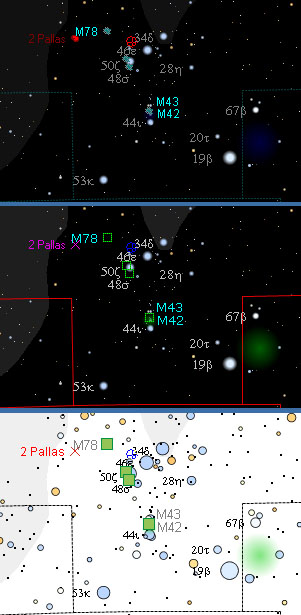 From top to bottom,
here you see part of Orion as displayed
in TheSky 6's default
"realistic" mode,
in the semi-realistic map-like mode that I created for it,
and in my customized version of "chart mode."
From top to bottom,
here you see part of Orion as displayed
in TheSky 6's default
"realistic" mode,
in the semi-realistic map-like mode that I created for it,
and in my customized version of "chart mode."
I'm a very experienced skygazer, and I'm using TheSky as a computerized map,
not as a picture of the sky.
It's a map with remarkable super-powers.
It computes the ever-changing
positions of planets, comets, and asteroids (such as Pallas in this picture).
It shows what's actually in the sky, relative to the horizon.
It merges several databases, including some I've made up -
one of which is the horizon as actually seen from my telescope stand,
including trees!
I like TheSky for its database-handling ability.
For sheer graphical quality, Starry Night
may still be slightly ahead of it; it's simpler to use but less customizable.
Both of them are excellent teaching tools for beginning skygazers,
and for that purpose, you need realistic images.
TheSky is a professional-level astronomical tool, and every serious user
probably customizes it quite a bit.
Many of us use it to control computerized telescopes.
No computerized star atlas is as good as a good printed one.
The reason is that a computer program uses multiple databases,
but with a printed atlas, the mapmaker merges all the data and makes
judgments before putting ink on paper.
(He knows in advance exactly what size it will be; there's no variation in the scale,
orientation, or brightness limit for faint objects.)
The best printed star atlas - in terms of quality of map - is probably
still Uranometria 2000.0.
It will be a while before computers can produce, on the fly,
charts as good as that.

|
 |
2004
June
11
|
Barbarism on the Internet / Film at Wal-Mart?
I spent the afternoon cleaning up after a computer virus infection.
Because of ongoing criminal investigation, no further details about it will appear here.
But this was one more reminder that the Internet is not civilized.
In a civilized society, ordinary individuals are rarely the victims of crime,
and they do not even have to take more than routine measures to defend
themselves against crime.
The Internet, on the other hand, is a cross between a very rough inner-city neighborhood
and a place that is constantly under terrorist attack.
At Wal-Mart this evening I noticed that
there's a lot less photographic film on the shelves
than there used to be.
What's left is all process C-41; no slide film, although some C-41 black-and-white material
is still there.
Memorandum: I'll have to go to the camera store, and pay much higher prices,
the next time I need Ektachrome 200 for astrophotography.
Much of the space formerly taken up by film was occupied by single-use cameras.
Is that the main market for film nowadays?
Are we all the way back to George Eastman's idea of returning your camera to Kodak for unloading?
I figure film photography will last a very long time as an art form.
It will die out some time after oil painting dies out.
But it has already ceased to be the primary way of producing pictures for
ordinary purposes.
I still use it for long exposures in astronomy because I can't afford a $10,000
multi-megapixel thermoelectrically cooled CCD camera.
Ordinary digital cameras don't do long exposures due to thermal noise.
(By the way, there is a certain kind of person for whom film means "motion pictures as
an art form" and who seems to be unaware that the word actually denotes
the material the movies are made out of.
These people turn up in photography forums occasionally and announce Film Festivals,
preferably involving south European languages, while the rest of us are talking about
how to develop Tri-X Pan...)

|
 |
2004
June
10
|
Windows Terminal Services Client Access Licensing (TS-CAL) (what?)
The dark side of
Windows
Remote Desktop Access
is that you have to pay big bucks for licenses if you want to do anything big.
With Windows 2003, Microsoft has decided that you can no longer easily make a computer open
to remote users - or - horror of horrors - they might not buy Windows for themselves!
I think this was an ill-advised move, and that the earlier policy was more reasonable.
But here's the deal.
- With Windows 2003 Server:
- With Windows XP Professional (which is not a server OS):
- You can have one user at a time, but that user can be remote.
Thus, you can experiment with remote access, but you can't have more than one person use the machine.
- With Windows 2000 Server:
- Same as Windows 2003 Server, but in addition, you have unlimited TS-CALs (with no
special action on your part) for clients who are running Windows 2000 Professional,
Windows XP Professional (not Home),
or Windows 2003.
Microsoft understood, very sensibly, that if you already have an equal or higher-level Windows OS,
then the server isn't giving you any OS services that you don't already have.
Unforunately, with Windows 2003, they stopped understanding it that way.
Our solution? We're going to downgrade a server from Windows 2003 to Windows 2000
to take advantage of the unlimited TS-CAL deal.
And we are going to sit back and wait for Microsoft to revert to the old policy
about licensing
(i.e., make Windows 2003 work the way 2000 does).
And we are well aware that Linux is inherently multi-user, with no limits on the number
of users.
We think Microsoft is grabbing for money in an inopportune place here.

|
 |
2004
June
9
|
Custom star maps
Too tired to do anything else, I spent part of the evening customizing TheSky very
extensively, then lost my settings because I didn't save them as a Display Properties file
(or something like that). Bother.
Although TheSky's realistic pictures of the sky are pretty, they're not what I actually want
from an online star atlas.
A map is not a picture.
So I've made some of my own choices to make everything look more like the classic maps by
Becvar and Tirion.
Now to do it again...

|
 |
2004
June
8
|
Sky mapping software
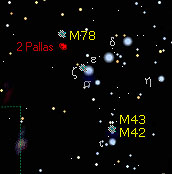 Today I received my copy of
TheSky 6,
the latest and greatest computerized star-map and telescope-control program.
Today I received my copy of
TheSky 6,
the latest and greatest computerized star-map and telescope-control program.
Latest and greatest, but not perfect.
Its arch-rival, Starry Night Pro,
will tell me the position of the Great Red Spot on Jupiter, and TheSky won't.
On the other hand, TheSky seems to have better databases for stars and other objects
outside the Solar System.
Both of them put more work into realistic graphics than I would have done.
These are the star atlases of the future.
In fact, a Pocket PC with Pocket TheSky and Pocket TPoint makes
a very good brain for a computerized telescope, much better than the firmware
in the telescope itself.

|
 |
2004
June
7
|
President Reagan / The grandeur of Britain
We mourn the death on June 5 of Ronald Reagan, whose surprise landslide election in 1980 changed
the direction of American politics and paved the way for the collapse of Soviet Communism.
Whether or not one agrees with the details of Reagan's politics is beside the point.
Two things about Reagan stand out.
First, he was what he claimed to be; he didn't tell himself that he could outsmart anyone.
(Some economists say the worst thing he did was to keep his campaign promises;
others say it's the best thing he did. They all agree that he kept them.)
Contrast this with the downfall of Clinton, who simply overestimated his ability to trick people,
and crashed in a tangle of deception.
Second, Reagan reintroduced into politics the important idea that
good and bad regimes are not morally equal.
An oppressive government does not have the same moral rights as a free, democratic one.
Perhaps no one since Eisenhower had believed this.
The theme of the 1970s was that evil was here to stay, and we must compromise with it;
the theme of the 1980s was that evil should be opposed.
The way Reagan saw it,
the Americans and the Soviet Union were not merely two competing teams;
one of them stood for freedom and the other did not.
This implies that we support our kind of government because it's good, not just because it's ours,
and if it fails to be good, we have a right and a duty to change it.
That is, you can criticize Reagan by his own standards;
but if you don't believe in standards, you can't criticize Reagan or anyone else.
It also explains something important that liberals don't understand about the Republican position
on some moral issues. Specifically: On issues of basic human rights, such as abortion or slavery,
what matters is what is right, not what is popular or politically feasible.
Abortion and slavery are very similar issues because they both revolve around the definition of a
human being, and nothing but the definition of a human being is ultimately relevant to them.
We admire Lincoln for seeing it that way; why not Reagan?
Here is part of the selection of distinguished and lofty titles that I was
offered when registering the cellphone that I use in Britain.
The provider is Virgin Mobile.
Apparently not all their clients are young students!
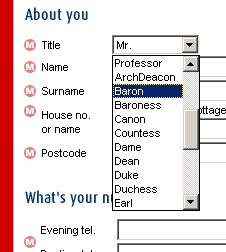

|
 |
2004
June
6
|
Transit of Venus
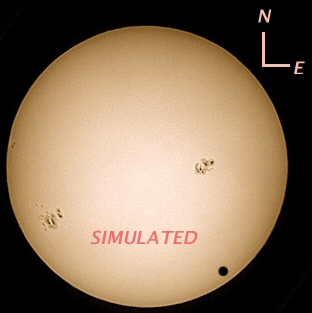 For the first time since 1882, Venus will pass in front of the Sun
on Tuesday morning.
For the first time since 1882, Venus will pass in front of the Sun
on Tuesday morning.
Here's what it will look like.
I took one of my existing sun pictures (showing sunspots) and used Photoshop to add
a black dot of the right size and approximate position.
The original picture was taken with a Nikon Coolpix 990 coupled to the eyepiece
of a 5-inch telescope with a Baader full-aperture sun filter.
Details here.
See also
Spaceweather and
Sky and Telescope.
This morning, CNN reports incorrectly that Venus will pass across the Sun "4 times."
Venus will of course only pass across the Sun once.
In the eastern United States, Venus will be about to leave the Sun's face at sunrise.
(The West won't see the event at all.)
Venus will reach the edge of the visible Sun about 7:05 a.m. Eastern Daylight Time
and will be completely off it by 7:25, give or take two or three minutes
depending on location.
And of course never look at the Sun without a safe solar filter.
The only filters safe to use with a telescope are those that go in front of it
to block out all the intense heat and light.
If you're in Athens, Georgia, and want to view the transit safely, note that
the University of Georgia will have telescopes set up on the Intramural Fields
starting at 6:30 a.m.

|
 |
2004
June
5
|
Gadget of the day: "Cell Rescue"
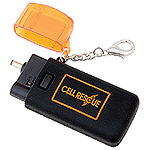 Today I bought Melody, Cathy, and Sharon each one of
these gadgets.
It's a keychain flashlight with 3 AAA cells,
and it will also power a Nokia cellular telephone
for about 30 minutes; then you replace the AAA cells.
Today I bought Melody, Cathy, and Sharon each one of
these gadgets.
It's a keychain flashlight with 3 AAA cells,
and it will also power a Nokia cellular telephone
for about 30 minutes; then you replace the AAA cells.
It certainly beats the other emergency cell phone chargers that I've seen,
which are disposable.
I also went to the
Atlanta Hamfest, a ham radio
convention and swap meet
(principally the latter).
It was the smallest, most poorly attended hamfest I've ever seen
(given that I only attend major ones).
Is ham radio a dying hobby?
Or has it gotten further away from the electronics industry than ever before?
Or has eBay taken over the sales that used to happen at swap meets?
Whatever it is, it's a pity, because hamfest swap meets always comprise everything
from World War II radio parts to the latest (well, almost latest) surplus computers.
Today there was a tremendous number of laptop parts that someone was trying to unload.

|
 |
2004
June
4
|
Windows bug of the day
We use USB external disk drives for backup.
Naturally, like any other USB device, the disk should be "stopped" before
disconnecting it, so we click on the little USB icon in the taskbar and
attempt to do so.
Recently, on our Windows Server 2003 machines, we've started getting the error message:
The device 'Generic volume' cannot be stopped because a program is still accessing it.
A quick look with
Process Explorer
(a very handy free utility)
shows that, in reality, no process has any files open on the removable drive;
the error message is erroneous.
I'm not sure whether this started happening as soon as we upgraded to 2003, but I'm inclined
to think not; in that case, it must have come in on a recent Windows Update.
There was a similar bug
in Windows 2000, and a fix was issued.
Unfortunately it isn't applicable to Windows 2003.
Fortunately, nothing goes wrong if we simply unplug the disk drive from the USB port.

|
 |
2004
June
3
|
More travel notes
Now that my colleagues and I have gotten our reservations, let me mention a hotel in London
that appears to be a particularly good deal:
Ramada Plaza Regent's Park.
It's right next to Lord's Cricket Pavilion and apparently attempts to make all its
money when there are cricket matches; the rest of the time it's quite modestly priced
(£95 per night, including tax).
This is remarkably affordable for a 4-star, fully air-conditioned hotel.
In a few weeks I'll tell you how it was.
Some other good chains of hotels in Britain are Radisson, Thistle, Holiday Inn, and Best Western.
And on the Cambridge leg of my journey I'll be staying in my old favorite,
the Crowne Plaza.
When using online reservation sites, make sure you don't end up in London, Kentucky,
if you want London, England.
Some of them are not too smart and will mix up all the Londons of the world in one menu!
This website is back in operation and faster than ever due to upgrades at Sectorlink.

|
 |
2004
June
2
|
Some Internet travel hints
I've just been arranging a major trip and have learned some interesting things.
- Tripadvisor has reviews
of hotels, some of which are brutally honest.
(Look up "Repton Hotel London.")
Useful!
Note however that some reviewers are unrealistic, and others have different expectations.
Some of them want a lot of attention from the hotel staff,
while others (like me) don't care, as along as the room is comfortable;
that is, we want the staff to do their thing before we get there
and then stay out of sight.
Tripadvisor will also let you compare offers for any particular hotel
through different agencies.
- Booking hotels online is a tricky business.
Some hotel chains (Crowne Plaza, Holiday Inn) have an Internet rate guarantee -
they guarantee that the hotel's own web site will give you the best available rates.
Many other hotels broker their unsold rooms through agencies such as
www.laterooms.com.
In that case the rooms are not available through the hotel itself, only through
the agency.
It's wise to Google the name of the hotel and see if you can identify everybody
who is offering rooms there.
And remember that not all agencies are equally reliable;
always check whether the hotel's own web site will give you a confirmed reservation
at the right price.
Sometimes the "discount" rate through an agent is higher!
- Sometimes the hotel chain's web site can be reached more than one way and
will give you different information!
I was able to book Ramada Inn rooms in Britain through
ramadainternational.com
at a time when
ramadajarvis.co.uk was
saying there were none available.
- If you're a government employee (national, state, or local, including state
college employees), be sure to check the appropriate box on the reservation form.
It opens doors. Rates are reduced, but more importantly, prepayment requirements
tend to go away.
- It's always wise to contact the hotel directly after making reservations through a broker.
- Maps of anything and everything are on line. Two of the
most useful sites are Mapquest
(for the United States)
and Streetmap (for Britain).
- I'm wary of super-bargains. If the price is much lower than the competitors,
there's a reason. If a good hotel room in a particular area costs $100, then a $30 room
isn't going to be good.
Ultimately, what you pay for is reliability.
A hotel with a 99% chance of being satisfactory may be worth three times
the price of one with only a 75% chance.
It depends on the value of the trip, and the cost of losing a day if you don't rest well.
Uploading of this entry was delayed by scheduled maintenance at Sectorlink.
Right now, I can't upload. You may not see it until June 3.

|
 |
2004
June
1
|
Internet Explorer Enhanced Security Configuration (...not?)
If you have Windows 2003 on a computer and you're not actually using it as a server -
but instead you're using it to run applications -
do yourself a favor and
disable Internet Explorer Enhanced Security Configuration.
This is done with Control Panel, Add/Remove Programs, Windows Components.
Just uncheck it.
Or if that's too drastic a move, click "Details" and confine it to administrators,
not ordinary users.
Then your computer will behave much more normally.
While Enhanced Security Configuration is in effect, you can't browse to "untrusted" web sites,
and you get an annoying prompt if you try to run a program that is on another machine on your network.
All of this can help secure a server, but apart from that, it's bothersome.
I don't even like the name "Internet Explorer Enhanced Security Configuration."
It's a tongue-twister with all those sibilant and alveolar consonants.
It's also wordy jargon of the kind we used to get from IBM.
It has vague words like "enhanced" and "configuration" tacked onto it.
Its effect isn't confined to "Internet Explorer."
So out of 5 words, we've eliminated 4.
"Security" is too vague, since you always have some kind of security.
Why not call this product "Extra Restrictions"?
I once had an idea for a Dilbert comic strip in which everyone buys something called
"Enhanced Resource Service Option Facility Package" without knowing what it is - and it
turns out to be nothing at all!
Anybody can string meaningless words together. I try to avoid doing so.

|
 |
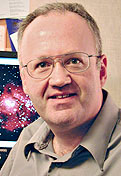

![]()
 I'm scrambling to get ready for a trip to England
with one or two graduate students.
We'll start in Cambridge (depicted here)
and attend meetings in London and Oxford,
including presenting a paper at a conference
on
I'm scrambling to get ready for a trip to England
with one or two graduate students.
We'll start in Cambridge (depicted here)
and attend meetings in London and Oxford,
including presenting a paper at a conference
on  As the postmark on a sympathy card, perhaps this one
doesn't strike quite the right note!
As the postmark on a sympathy card, perhaps this one
doesn't strike quite the right note!

 (1)
Before connecting your PC to any unknown network,
such as a wireless network in a hotel,
turn on Internet Connection Firewall (ICF).
(1)
Before connecting your PC to any unknown network,
such as a wireless network in a hotel,
turn on Internet Connection Firewall (ICF).



 From top to bottom,
here you see part of Orion as displayed
in
From top to bottom,
here you see part of Orion as displayed
in  Today I received my copy of
Today I received my copy of

 For the first time since 1882, Venus will pass in front of the Sun
on Tuesday morning.
For the first time since 1882, Venus will pass in front of the Sun
on Tuesday morning.
